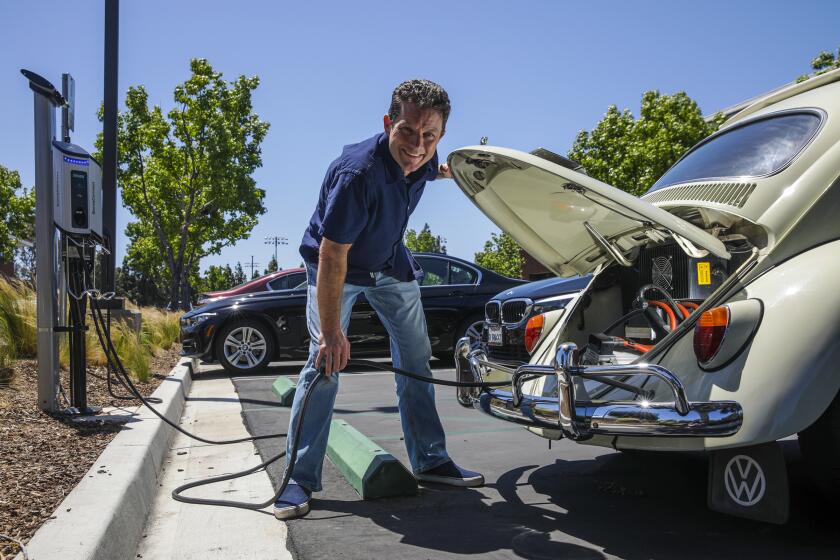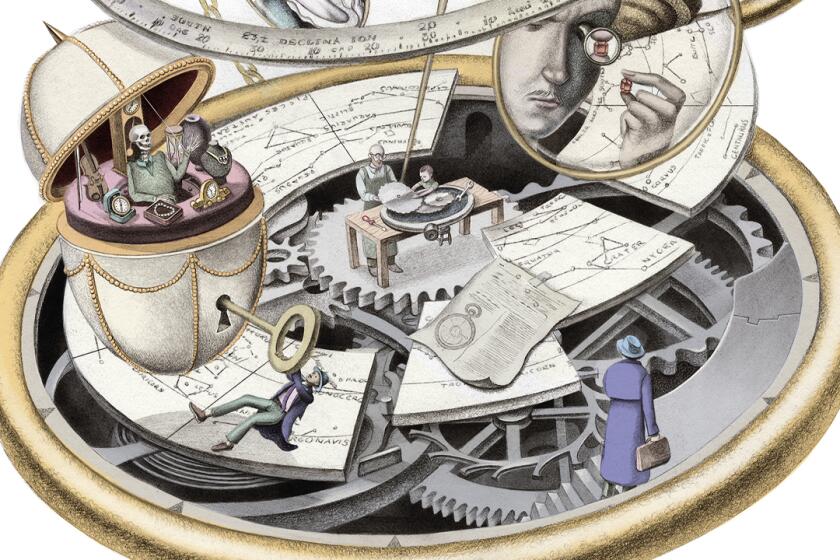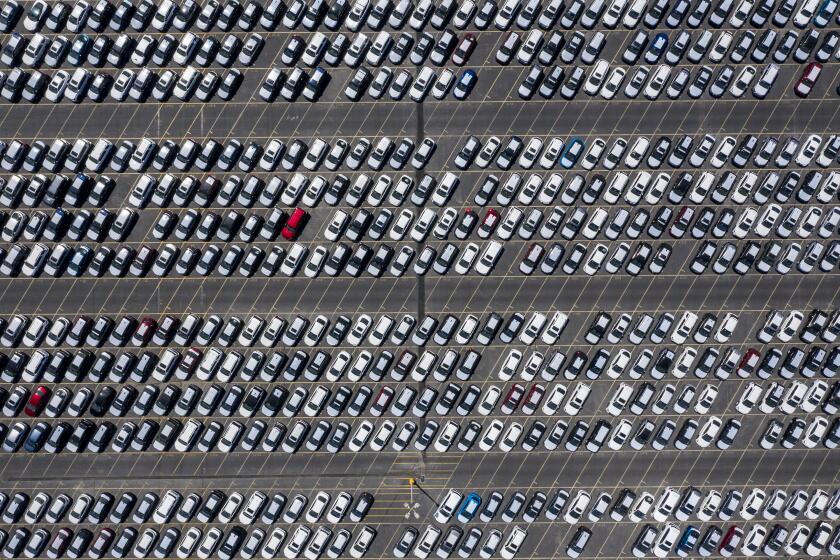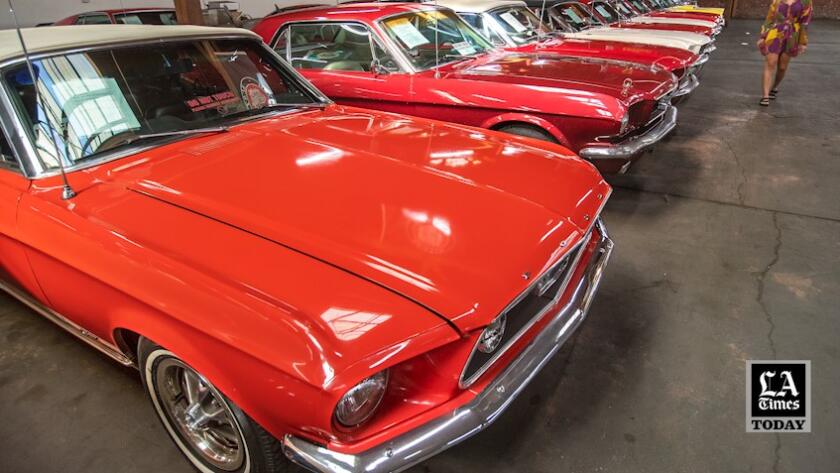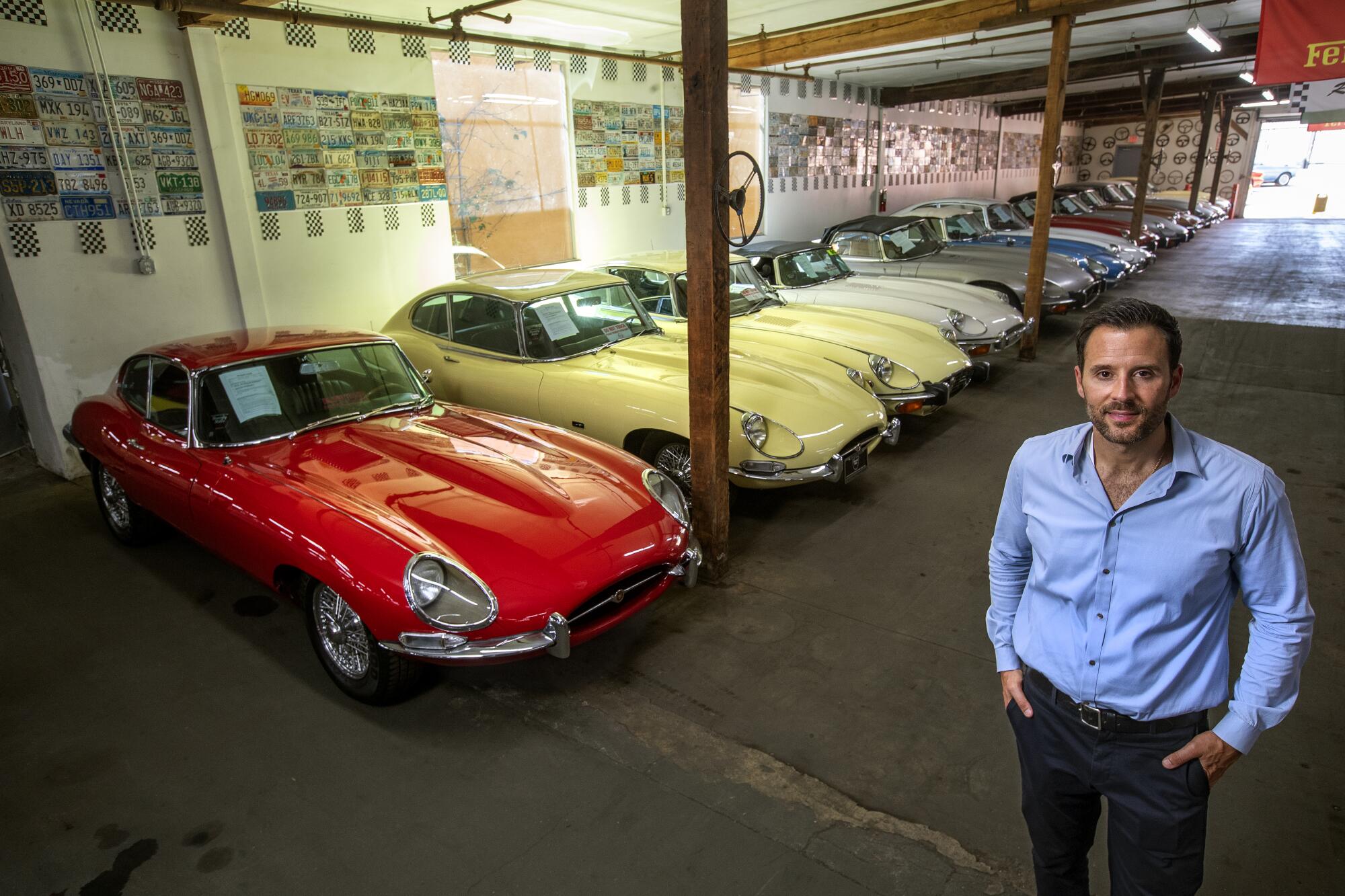
- Share via
A warehouse along the train tracks east of downtown Los Angeles isn’t where you’d expect to encounter a sprawling collection of classic cars. But beyond a spiked metal fence — and about 15 miles from Beverly Hills proper — you’ll find Beverly Hills Car Club.
Inside, row after row of Porsches, Jaguars, Ferraris, Mercedes-Benzes and other vehicles sit under fluorescent lights in rooms decorated with automobilia. Some look like they belong in a museum, others in a scrapyard. This immense and varied inventory is just one distinguishing feature of the upstart dealership, which has challenged the traditional business model of the classic car industry as it has grown to be one of the nation’s biggest sellers.
The force behind the company is Alex Manos, 40, a telegenic entrepreneur of the internet age. With a web-focused operation optimized for easy browsing and a social media presence that promotes the dream of classic car ownership, his dealership has differentiated itself in an industry that at times can be overly tradition-bound. Manos has become a celebrity within the automotive sector and is increasingly finding fame beyond it: He is engaged to Farrah Aldjufrie, daughter of “The Real Housewives of Beverly Hills” star Kyle Richards, and has appeared on the show at the dealership.
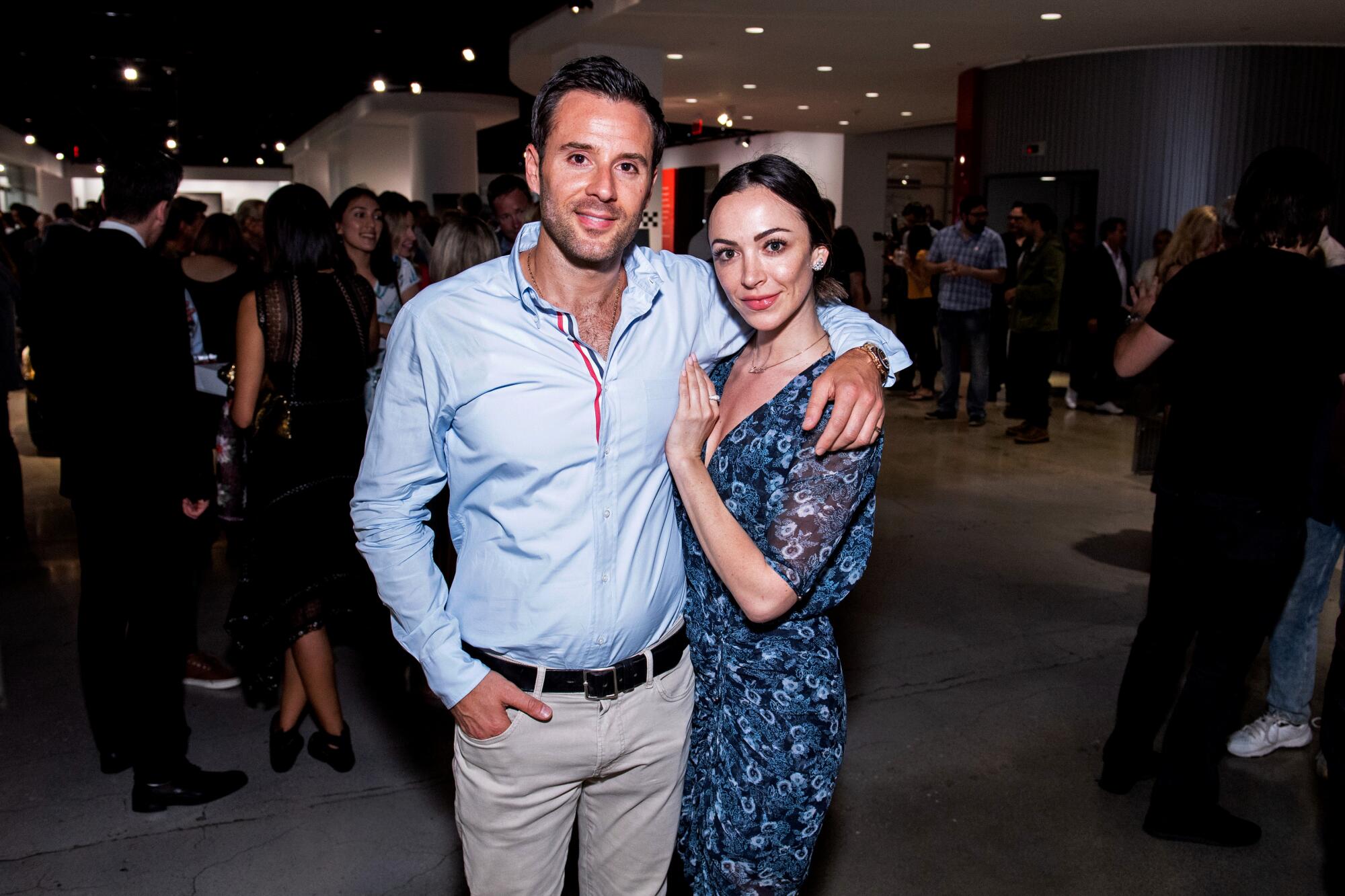
The marketplace for classic cars can seem opaque — and perilous — for a novice. Dealers have limited inventories and charge premium prices for pristine rides. Auction houses tack on big fees and require mastery of complex bidding processes. Private-party sellers could be located across the country, or on another continent. It can take years of scouring the classified pages of car magazines, message boards and Craigslist to find rare models.
Beverly Hills Car Club appears to take away the friction of the experience. Its website documents every car in its inventory with studio photography and promotes many with well-honed social media posts. Unlike most classics dealers, Beverly Hills Car Club offers hundreds of vehicles, many of them uncommon or unusual, at just about every price point — and in all manner of condition. The presence of cars pocked with dents, blanketed in rust or missing key components has led one classic car consultant to compare the dealership to a thrift store.
“The cars we sell could need work, but they also could be perfect. We have a car for $5,000 and that car is a million dollars,” said Manos, referring to a rare 1961 Mercedes-Benz 300 SL Roadster. “That’s what makes us unique and brought us so much attention.”
This business model has made Beverly Hills Car Club stand out — for better or worse. Removing barriers to classic car ownership has spurred the company’s growth, but it also has been a source of trouble: When transactions go awry, the problems tend to involve allegedly damaged or compromised cars.
Over the years, customers have alleged in lawsuits that Beverly Hills Car Club sold them vehicles that had undisclosed damage or defective parts or were misrepresented by the company. Buyers who spent tens of thousands of dollars wound up mired in years of litigation and never got to enjoy their dream cars. In one instance, the dealership sold a rare Porsche 911 that allegedly included parts from a different vehicle. Beverly Hills Car Club was also investigated by state regulators for having two stolen cars in its inventory; it got off with a written warning, records show. Articles on the company’s website written by Manos contain language plagiarized from automotive publications and other sources, reporting by The Times has revealed.
“I am extremely proud of the company my family has built and the countless loyal customers who continue to recommend us and do repeat business with us,” Manos, co-owner and chief financial officer of the dealership, said in a statement. “When assessing the work of our company, it is critical to understand that the isolated legal disputes represent a tiny fraction of the 14,000 cars we have bought and sold during the past 13 years.”
High gasoline prices and concerns about climate change and pollution are pushing some drivers to turn vintage cars into electric vehicles.
Many customers appreciate the convenience, among them photographer Tyler Shields, who purchased a 1962 Rolls-Royce Silver Shadow to blow it up in the Mojave Desert in the name of art. Asked about the meaning of the project, which he documented with a series of photographs showing the car engulfed in flames, Shields quoted a line from the film “Fight Club”: “The things you own end up owning you.”
Later, Shields bought a 1982 Ferrari 308 GTSi that he drives regularly. “They are the only place that operates the way that they do, and has the things that they have,” he said.
‘Volume and velocity’
It all began with a Lincoln Continental. It was around 2004, and Manos was restoring a black convertible, like the one in the opening sequence of the HBO hit “Entourage.” Manos spent a year getting it just right.
“It needed everything,” he said.
He eventually sold the Continental at a profit, but came away realizing it simply wasn’t worth the expense. “If you divide your time by the year, by how much effort you’re putting in, you’re not really making any money,” Manos said.
The experience came to mind a few years later when he and his mother, Versa Manos, were discussing starting a classic car dealership. He explained: “The lightbulb moment when we started this was — let’s make it small margin, and move volume, and scale the business.”
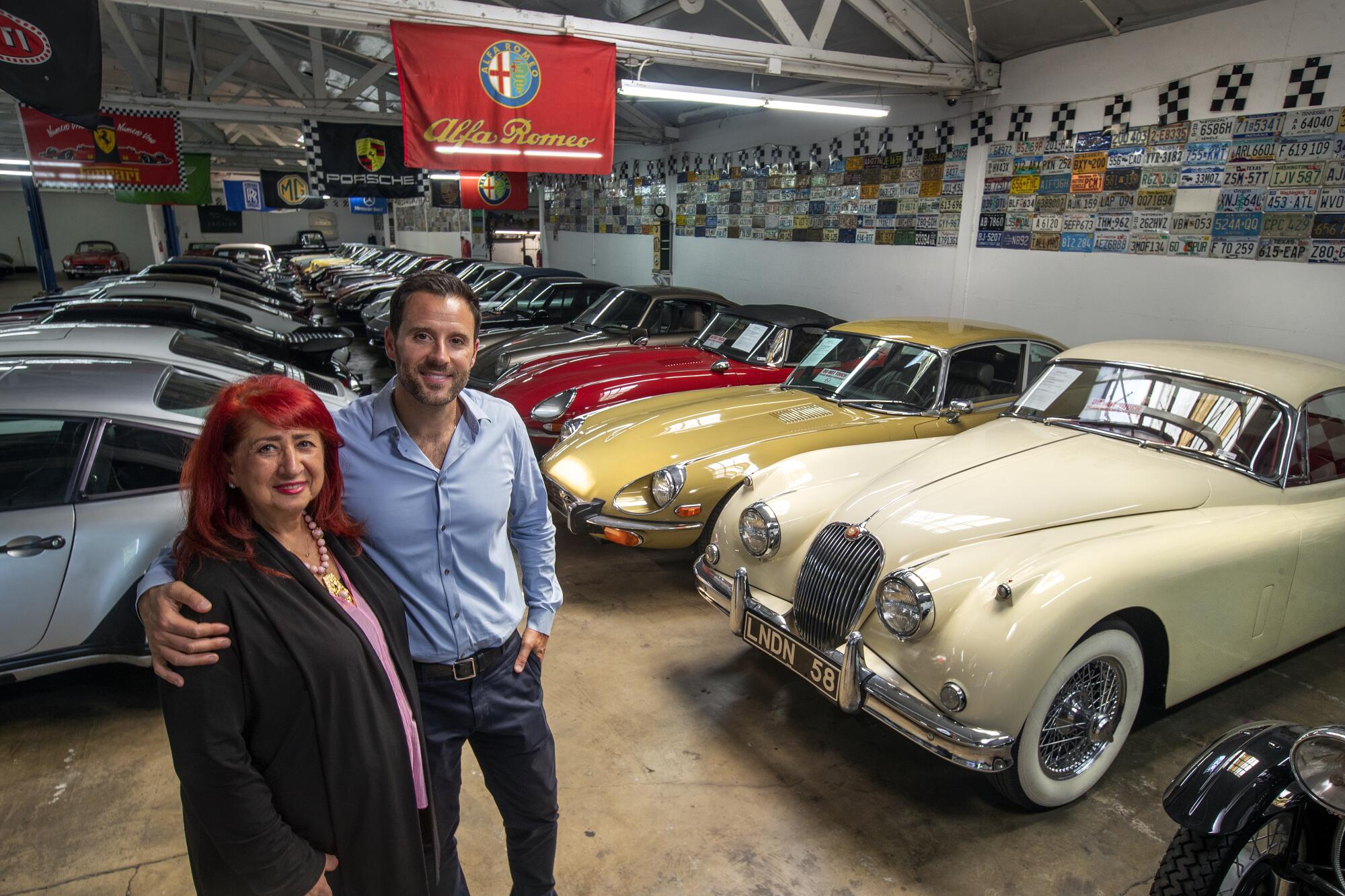
Manos and his mother launched Beverly Hills Car Club in 2009. What began as a homespun project now employs 45 people at a cavernous warehouse facility.
During a tour of Beverly Hills Car Club, the breadth of offerings was on display. Take two cars parked next to each other: a 1939 Delahaye 135M Cabriolet for sale for $185,000, and a 1974 Datsun 260Z offered at $29,950. The Datsun is a relatively common Japanese sports car described by the dealership as “mechanically sound,” and with its shining orange paint and clean interior, the coupe looks as though it could be driven as-is for miles to come. The Delahaye, meanwhile, is an exceedingly rare French vehicle that Beverly Hills Car Club says is the only one of its kind still in existence. But the 135M would require a complete restoration — it has significant rust damage, the convertible top is tattered and the interior is filled with cardboard boxes holding several parts.
Most of the dealership’s competitors keep smaller inventories and do not advertise vehicles with major cosmetic or mechanical problems, instead presenting cars in top condition.
“We do not materially change or alter the vehicles we buy and sell,” said Manos, who gave The Times a short, on-the-record interview during the tour but otherwise answered questions via email. “We want our customers to be able to fulfill their dreams as to what the car will ultimately look like and how it will perform. Our customers find great joy in rebuilding and customizing their dream cars.”
A gold pocket watch said to have been made for J.P. Morgan disappeared, prompting a hunt that plunged into the baroque world of high-end antiquities.
The dealership inspects automobiles that come in, with a multi-step intake process that includes cleaning and detailing, photography in a studio, a 108-point inspection, and ends with a test drive — if the vehicle is working. But it will not sink in the time, labor and expense needed to turn an acquisition into a showpiece.
Indeed, Manos noted that Beverly Hills Car Club sells some cars that are “inoperable,” and designated “planned non-operation” with the California Department of Motor Vehicles — a classification for vehicles that won’t be driven.
Would-be buyers are encouraged to “carefully inspect the classic vehicles they are interested in purchasing” and arrange for on-site assessments by independent experts who can conduct “proper due diligence,” Manos said.
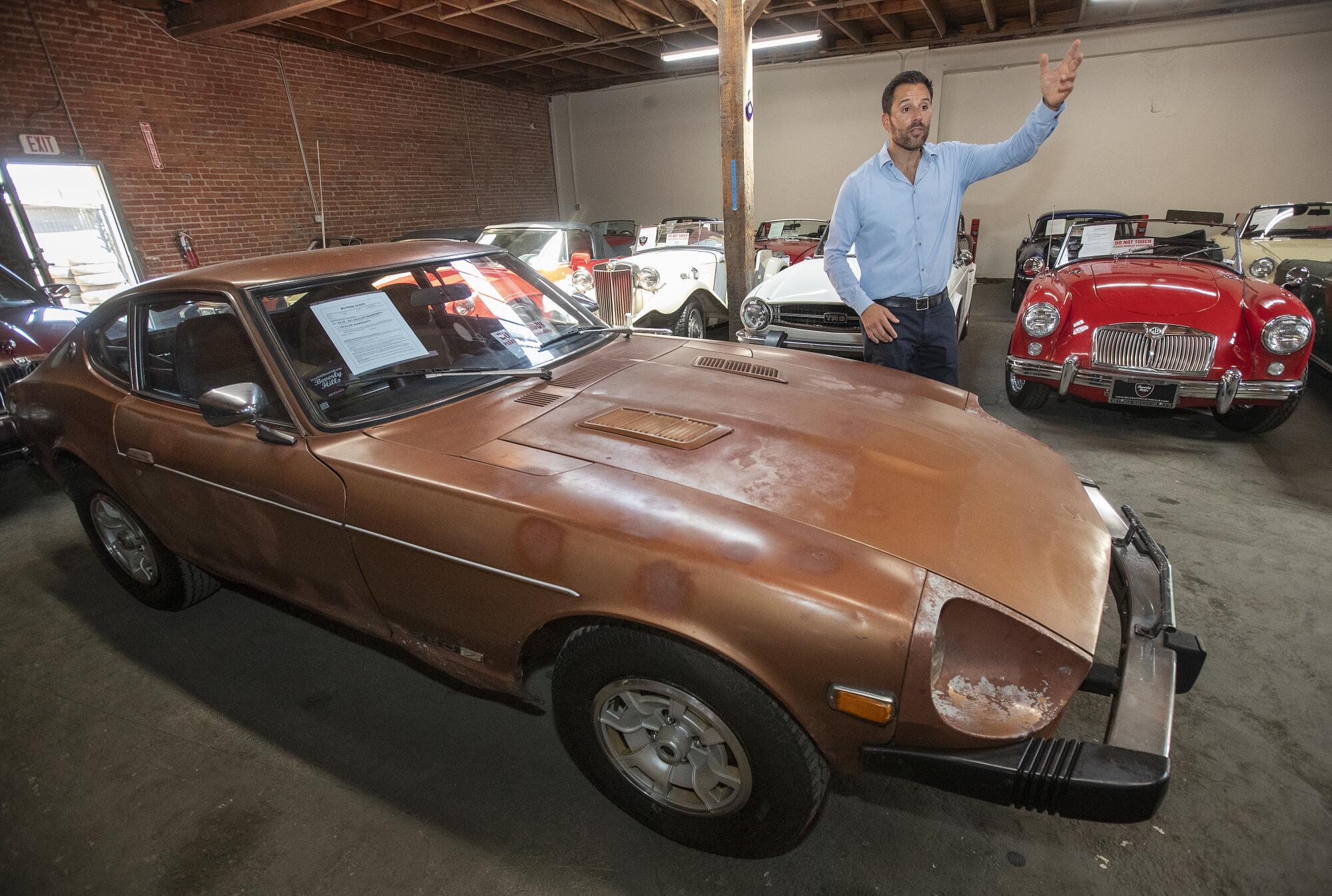
Bill Kelley is one such expert, part of a growing field of gearheads who, for a price, inspect vehicles on behalf of prospective buyers. He runs a consulting service for buying and selling vintage Porsches, and, over roughly a decade, he has inspected nearly 30 cars at Beverly Hills Car Club on behalf of clients. Kelley said Beverly Hills Car Club’s approach to selling classics is predicated on “volume and velocity,” a key aspect of a model unique among classics dealers.
“There is no other place that I can think of that puts up for sale cars with obvious damage,” Kelley said. “This is the swap meet aspect of Beverly Hills Car Club.”
The Alfa Romeo sale
Though the dealership offers cars with straight bodywork, shiny chrome and immaculate interiors, its shabbiest vehicles — rides meant to be scavenged for parts because of issues such as collapsed roofs and ravaged engine bays — have become a running joke among some auto aficionados, including those who have taken to social media to poke fun at the company.
A 2016 article on the car website Hooniverse said Beverly Hills Car Club is known for “pretty optimistic pricing on some remarkably decrepit … but still kinda tempting vehicles.” The story focused on a Continental that had faded to the color of “corpse skin.”
For customers who know what they’re looking for, there are diamonds in the rough.
Troy Ladd, the founder of Hollywood Hot Rods, a high-end custom car shop in Burbank, has bought two cars from Beverly Hills Car Club since 2020. One was a 2002 Ferrari 360 Spider he purchase for $54,000. It wasn’t perfect, he said, but the low price reflected that fact. After Ladd spent some time addressing small issues, such as replacing interior gauge lights, he pronounced the drop-top Ferrari “a beautifully designed, amazing supercar.”
“Did they point out every little thing? No. Did they even know about every little thing? I doubt it,” Ladd said. “If they were charging me $100,000 and calling it perfect, I’d have a problem with that. But they never painted a picture that wasn’t there.”
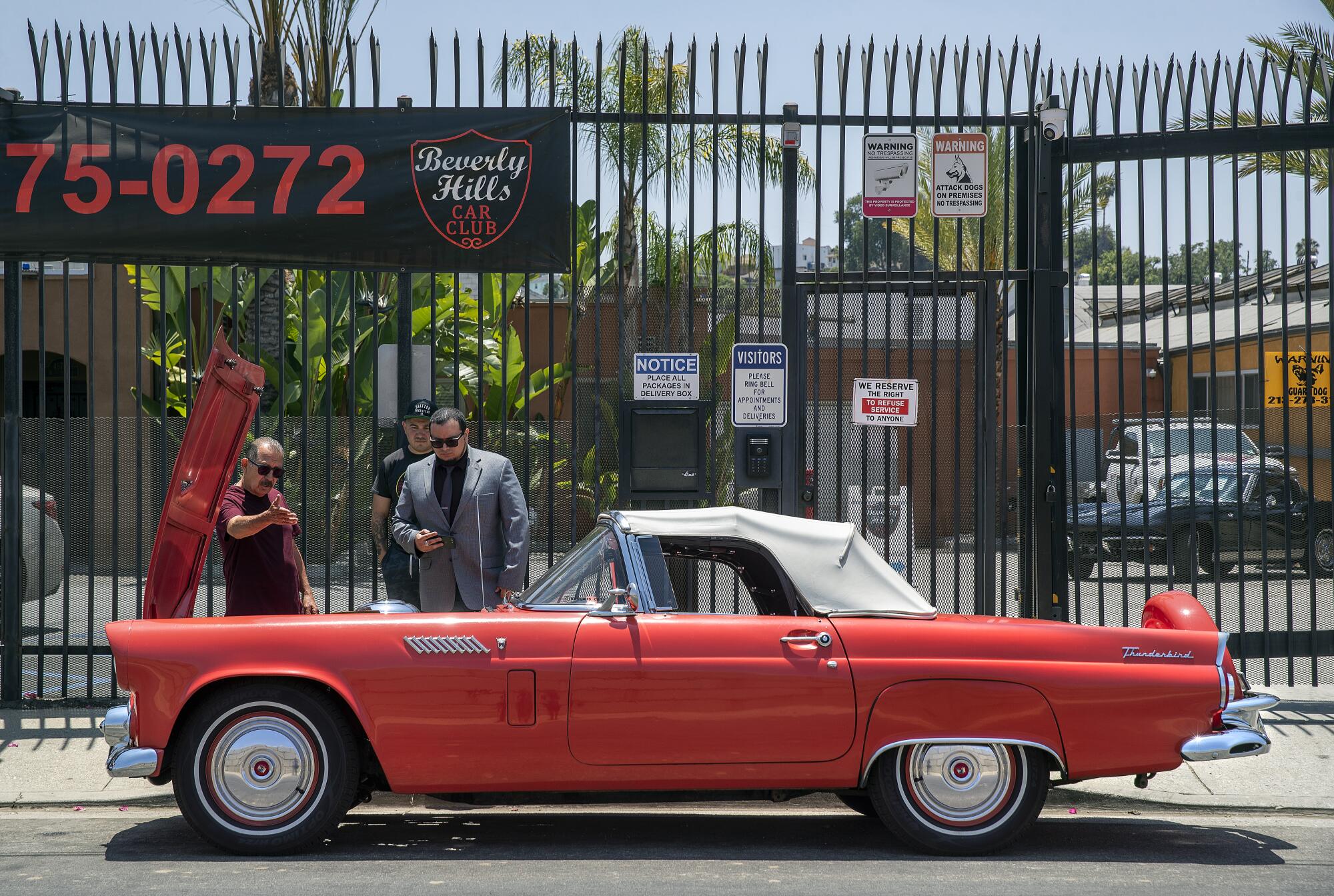
Some customers with less experience in classic cars, however, have run into issues that have prompted legal action.
Jan Michael Kubr, a Silicon Valley engineering manager, dreamed of driving an Alfa Romeo GTV 2000 coupe along the famed Skyline Boulevard in the hills above San Jose. He didn’t consider himself an automotive expert when he came across one on Beverly Hills Car Club’s website in 2018, but the dealership’s online presence inspired confidence.
“You see they have some really nice cars — obviously the Alfas, the Jags,” said Kubr. “And the sheer volume of vehicles definitely helped. You think: There are so many cars, they know what they are doing.”
Kubr paid $22,000 for a GTV 2000 that — he would later claim in a lawsuit — was advertised by the dealership as “mechanically sound.” But he said trouble arose when his mechanic’s initial once-over revealed one of the “rear springs was broken in half,” among other problems that he alleged hadn’t been disclosed.
He sued Beverly Hills Car Club in L.A. County Superior Court for allegedly violating the state Consumers Legal Remedies Act, which protects against misrepresentation, including the sale of damaged cars that aren’t marketed as such. The dealership denied the allegations and argued that Kubr signed a purchase agreement that said the car was “sold in an ‘AS IS WITH ALL FAULTS’ condition.”
Per state law, car dealers must conduct a safety inspection for any vehicle they sell. “The question is, did they inspect it and just not disclose it?” wondered Kevin Faulk, attorney for Kubr. “Or did they just say, ‘It looks fine, let’s just sell it’?”
According to attorney Gregory Babbitt, an automotive law expert who has not had dealings with Beverly Hills Car Club, “There is case law that says you can’t sell a vehicle that is a danger on the road.”
Manos said that “under no circumstances has Beverly Hills Car Club knowingly sold a car that was ‘a danger on the road,’” adding that clients are shown vehicles’ inspection results “so they know of any issues that need to be addressed.”
“We do not conceal the condition of our cars,” he said. “Nor do we make false or misleading representations.”
A unique set of circumstances brought on by the pandemic has roiled the used car market, leading to an inventory shortage that has sent prices soaring.
Kubr and the dealership settled the lawsuit in 2020. He declined to disclose terms of the confidential settlement, but noted the vehicle was returned to the dealer.
Manos attributed Kubr’s lawsuit to “a simple case of buyer’s remorse.” He added: “to maintain positive customer relations, Beverly Hills Car Club agreed to rescind the sale and refund the money to the buyer.”
In July 2021, Kubr saw that the Alfa was again for sale on Beverly Hills Car Club’s website — and still described as “mechanically sound.” He had words of caution: “I hope no one else buys this thing. Really.”
By October, the Alfa was listed as sold.
Citing the new owner’s privacy, Manos declined to disclose details of the sale, but said that “the minor items which Mr. Kubr complained about were fixed to ensure that any future buyer would not experience any issues.”
French legal fight
Many vehicles on the Beverly Hills Car Club website are described as “mechanically sound.” What exactly that means is an open question.
Attorney Bryan W. Shook, who specializes in automotive law and has not had dealings with Beverly Hills Car Club, called it a “somewhat vague or ambiguous” term. And Manos did not respond to a question asking him to explain what it means.
The issue came up after Bernard Parlange purchased a 1966 Ford Mustang from Beverly Hills Car Club for $18,000 in 2011. Parlange, who had previously bought two cars from the dealership without incident, had the Ford shipped to France, where he resides. The Mustang then sparked litigation on both sides of the Atlantic. And Beverly Hills Car Club’s legal approach, which at times appeared slap-dash, eventually cost it — according to Parlange’s U.S.-based attorney — a six-figure sum.
Before the sale, the dealership allegedly assured Parlange that the car “runs and drives as it should,” but it actually “was in such a bad condition that it was inoperable,” according to legal documents he filed.
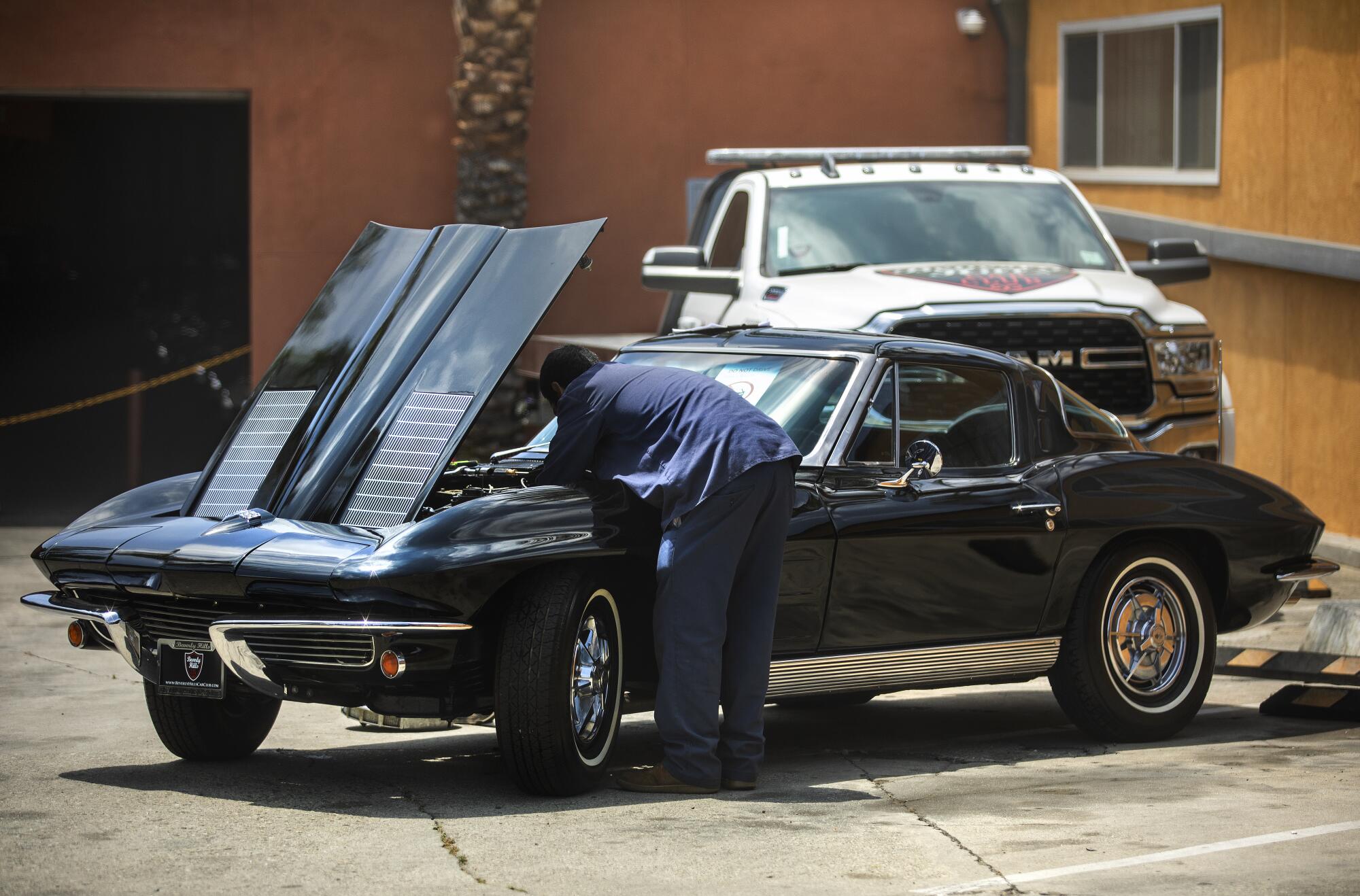
Parlange sued Beverly Hills Car Club in Bordeaux Regional Court, which appointed an expert who determined that “a significant level of corrosion” on the Mustang’s frame rendered it “highly dangerous,” according to a filing by the court. It noted that the dealership “did not show for the trial.”
Manos said that his company had been unaware of the “alleged defect.”
“Had this alleged condition been known at the time of the purchase, Beverly Hills Car Club would have disclosed it,” he said.
The court ruled in favor of Parlange in 2015. A year later, Parlange filed a lawsuit in L.A. County Superior Court to enforce the roughly $75,000 judgment he obtained in France because, according to the complaint, the dealership had refused to pay.
In a court filing, Beverly Hills Car Club denied Parlange’s allegations. Manos said the dealership’s lawyer told him that the French court had no jurisdiction over his California business, a position he now acknowledges was erroneous.
After years of legal skirmishing, the L.A. court ruled in favor of Parlange in 2018, records show. Douglas E. Hewlett Jr., who was Parlange’s stateside lawyer, said that Beverly Hills Car Club wound up paying Parlange about $270,000 including administrative and attorneys’ fees.
“It just kept ballooning,” Hewlett said. “We were kind of dumbfounded that they could be running a business this way.”
Manos declined to confirm that his company paid about $270,000. He said that after the judgment was entered, the parties “negotiated a confidential settlement.”
Hewlett said there was no such settlement, and provided The Times with a copy of a letter that Beverly Hills Car Club sent him that referenced payments totaling about $270,000 to satisfy the judgment and fees the company owed.
‘The right guy’
A circuitous path took Manos from a London upbringing to prime-time TV appearances.
His childhood was laced with glamour — a Daily Mail story on Beverly Hills Car Club’s sale of a Ford Thunderbird once owned by Joe Strummer noted that Manos knew the Clash frontman as a kid. That was through his mother, Versa Manos, a friend of the British singer who also worked in public relations, with a focus on “making rock stars famous or not,” he told Automobile magazine.
After briefly living in Australia, Manos immigrated to the U.S. when he was 12 years old (he said he became a U.S. citizen last year). In Los Angeles, he “immediately fell in love with the car culture.” He said that he spent part of his childhood in Beverly Hills and attended Beverly Hills High School. It’s those ties that led him to later name the dealership for the city, he said. (These days, Manos’ personal ride also says “Beverly Hills”: it’s a 2021 Mercedes-Benz S580, which had a starting price of about $117,000.)
Manos is often referred to as Beverly Hills Car Club’s founder — including on his LinkedIn profile — but he said it was actually his mother who founded the company in 2009. To be sure, DMV files indicate that the dealership’s license was secured by her that year.
Manos said that he began as the company’s classic car buyer, later becoming a partner and chief financial officer. He also oversees marketing, management and sales at the dealership, which he said employs “local members of the community” from its Eastside environs. Manos said he now owns 50% of Beverly Hills Car Club, with the other half held by his mother, who serves as chief executive.
As the dealership has grown, so too has Manos’ personal brand. He boasts about 125,000 Instagram followers, and uses the account to promote his dealership’s inventory and the classic car lifestyle. Manos shares details about the rides he’s selling alongside bromides about self-care, drawing praise from Paris Hilton and other reality TV stars. For a time, he even had a bit of a catchphrase: “Drink your water.”
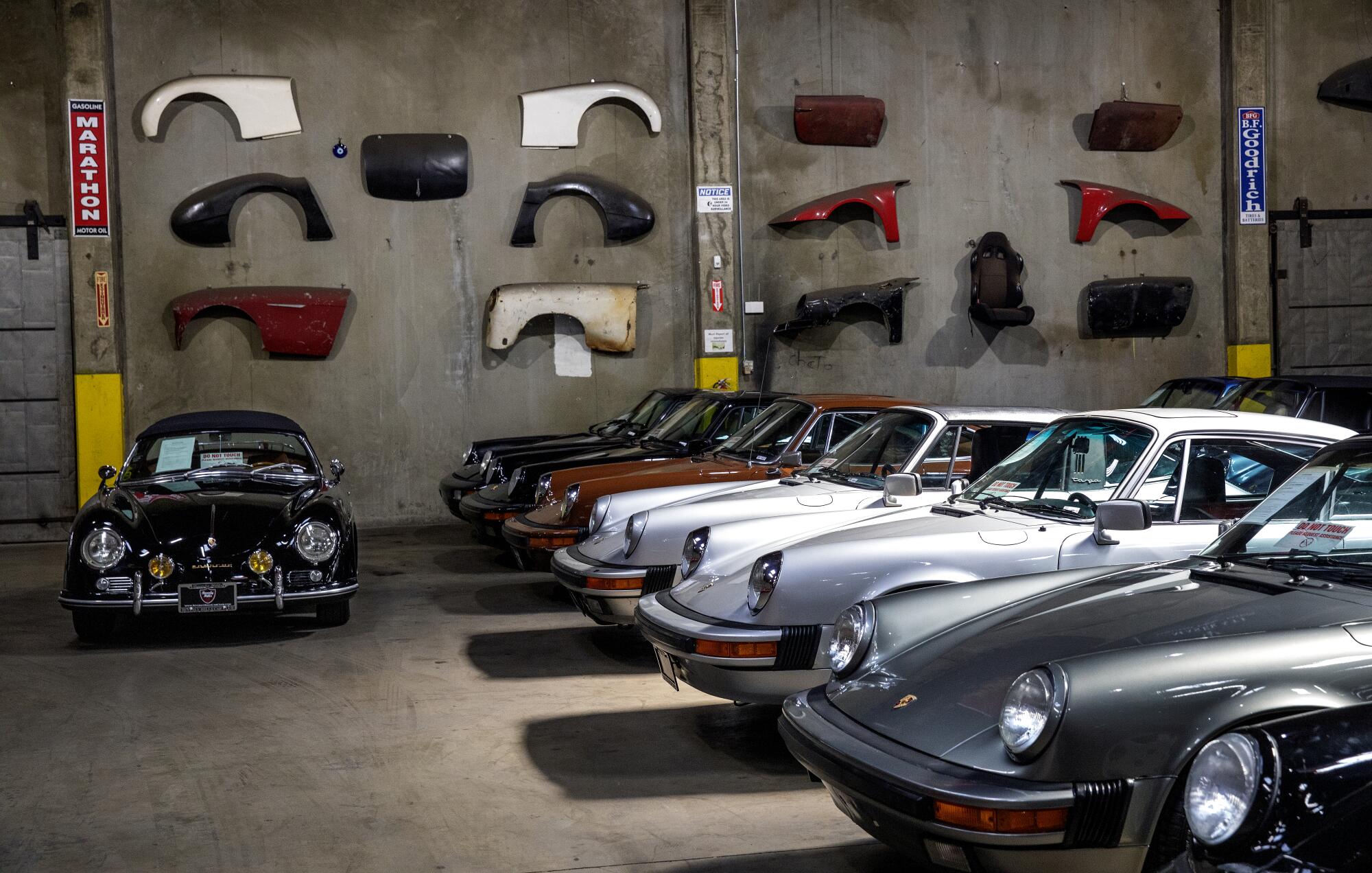
Beverly Hills Car Club has sold a Rolls-Royce to Justin Bieber and dealt several rides previously owned by celebrities, among them the Ferraris of Miles Davis and John McEnroe, Manos said. And it is currently offering a Mercedes-Benz once owned by Michael Jordan for $135,000. (Manos declined to disclose his dealership’s sales figures.)
Manos seems poised to become a bigger TV character: He and Aldjufrie announced their engagement in November via her Intagram account, a milestone that drew tabloid coverage.
“Farrah’s with the right guy,” Richards said in a 2020 episode of “The Real Housewives of Beverly Hills” that saw her and fellow cast member Erika Jayne visit Beverly Hills Car Club. Manos showed the women around the facility, and gave Richards the keys to a 1966 Jaguar XK-E for a quick cruise. In another episode, Manos delighted Richards when he spoke about having a child with Aldjufrie.
Manos acknowledged that Beverly Hills Car Club’s digital presence — on Instagram it boasts 250,000-plus followers — helps “enhance visibility of our inventory and drive traffic to our warehouse.” It also has enabled the dealership to court a global audience.
Compared with its competitors, Beverly Hills Car Club has a robust online operation, but one of its marketing efforts crosses a line: It includes plagiarized language.
In spring 2021, Beverly Hills Car Club sent an email to its mailing list that touted a new feature on its website: “Car Tales,” a series of essays that promised to reveal “Adventures in Classic Car Buying!” The stories, which link to the dealership’s current inventory, read like the prose of a veteran automotive journalist or historian. They’re also written in first-person and attributed to Manos.
His July 2021 essay about the DeLorean DMC-12 included a section on the first “Back to the Future” film that was copied from a 2020 piece published by Screen Rant, a movie and TV news website. In an article from the same month about an Alfa Romeo Giulietta Sprint Speciale, Manos used material from a 2020 Motor Trend article about the history of the carmaker’s logo. And an August 2021 story by Manos on the Porsche 356A Speedster included language lifted from a 2018 story on Silodrome, a car culture website.
Manos did not respond to multiple questions about the plagiarism.
Representatives of Screen Rant and Silodrome said that Manos’ use of their material was not authorized; a Motor Trend rep said the matter had been referred to the publication’s legal counsel.
- Share via
Watch L.A. Times Today at 7 p.m. on Spectrum News 1 on Channel 1 or live stream on the Spectrum News App. Palos Verdes Peninsula and Orange County viewers can watch on Cox Systems on channel 99.
Controversial cars
In the classic car world, provenance is key. Buyers want to know a vehicle’s backstory — the service history, the chain of ownership and more. Perhaps most of all, in the case of rare, high-dollar rides, they want to verify authenticity.
That requires meticulous research. In this area, Beverly Hills Car Club’s approach has been the subject of scrutiny. And an investigation of the dealership by a state agency revealed how it was roiled by a long-standing hazard of the classics business: the sale of ill-gotten automobiles.
Documents obtained via a public records request show that the dealership was investigated by the DMV in 2013 for having two cars in its inventory that had been stolen. A note in the case file said that the dealership did not “check vehicles when they buy vehicles from out of state” to see if they are stolen.
It is a violation of California’s penal code to knowingly buy or sell a stolen car, and a dealership that does so could have its license revoked. According to the DMV records, the stolen cars were taken from Beverly Hills Car Club by authorities, and the company was issued a written warning.
Manos said that when his dealership purchased the cars it received ownership paperwork and a bill of sale for each. There was “no reason to suspect that they were stolen or that the seller did not own them,” he said.
Experts said that verifying a car is not stolen ahead of acquiring it is a basic tenet of the auto business — though this can be tricky with classics, because it is harder to account for their lengthy history. Manos said that the national registry for stolen vehicles was “not very reliable” around the time of the episode, and it was “difficult to know whether a car was stolen unless we received notification” from law enforcement.
“Today, the system, while still imperfect, is more robust,” he said.
Shook said that he advises his dealer clients to “physically look at the [car’s] VIN number and make sure it looks good and that it hasn’t been tampered with.”
“Thieves and fences are pretty good at disguising these things,” he said. “A lot of times with this older stuff the knowledge just isn’t there on the part of the dealer.”
Knowledge of an uncommon vehicle’s particulars came into play with a Porsche that Beverly Hills Car Club sold a few years ago. The transaction led to a Byzantine legal battle that highlights a risk of Beverly Hills Car Club’s business model: By not fully restoring automobiles before selling them, the dealership may be unable to get a truly complete picture of their condition. And with pricey rides, it’s often the little details that matter most.
In Porsche collecting circles, the 1967 Porsche 911 Targa S is something of an icon. Few were made, and the car’s special features — namely its fold-down, soft rear window and powerful motor — make it highly collectible. Strong specimens command premium prices: Bring a Trailer, an auto auction website, sold an example last year for $427,000.
Charles A. Miller found one for sale on Beverly Hills Car Club’s website four years ago and bought it for $157,000. He sent the Porsche to Farland Classic Restoration, a high-end shop based in Englewood, Colo., and ordered up its complete refurbishment.
But Miller’s plans were dashed when Farland began disassembling the 911. According to an L.A. County Superior Court lawsuit filed by Miller against Beverly Hills Car Club in 2019, the vehicle was not a genuine 1967 Porsche 911 Targa S.
“He was heartbroken,” said Michael C. Rogers, Miller’s attorney. “This was his particular dream car.”
The complaint, which accused the dealer of fraud and other claims, alleged that the vehicle was actually a 911 coupe that had a 1967 911 Targa S vehicle identification number “welded into the [car’s] body.”
The restoration shop’s probing revealed that the Porsche’s roof was allegedly cut to accommodate a Targa fold-down window, and “structural body gusseting” was welded onto the vehicle to make it look like a Targa, among other claimed modifications listed in the lawsuit.
Beverly Hills Car Club denied the allegations in a court filing, and argued in part that Miller had signed a sale agreement that said the car was sold “in an ‘AS IS WITH ALL FAULTS’ condition.”
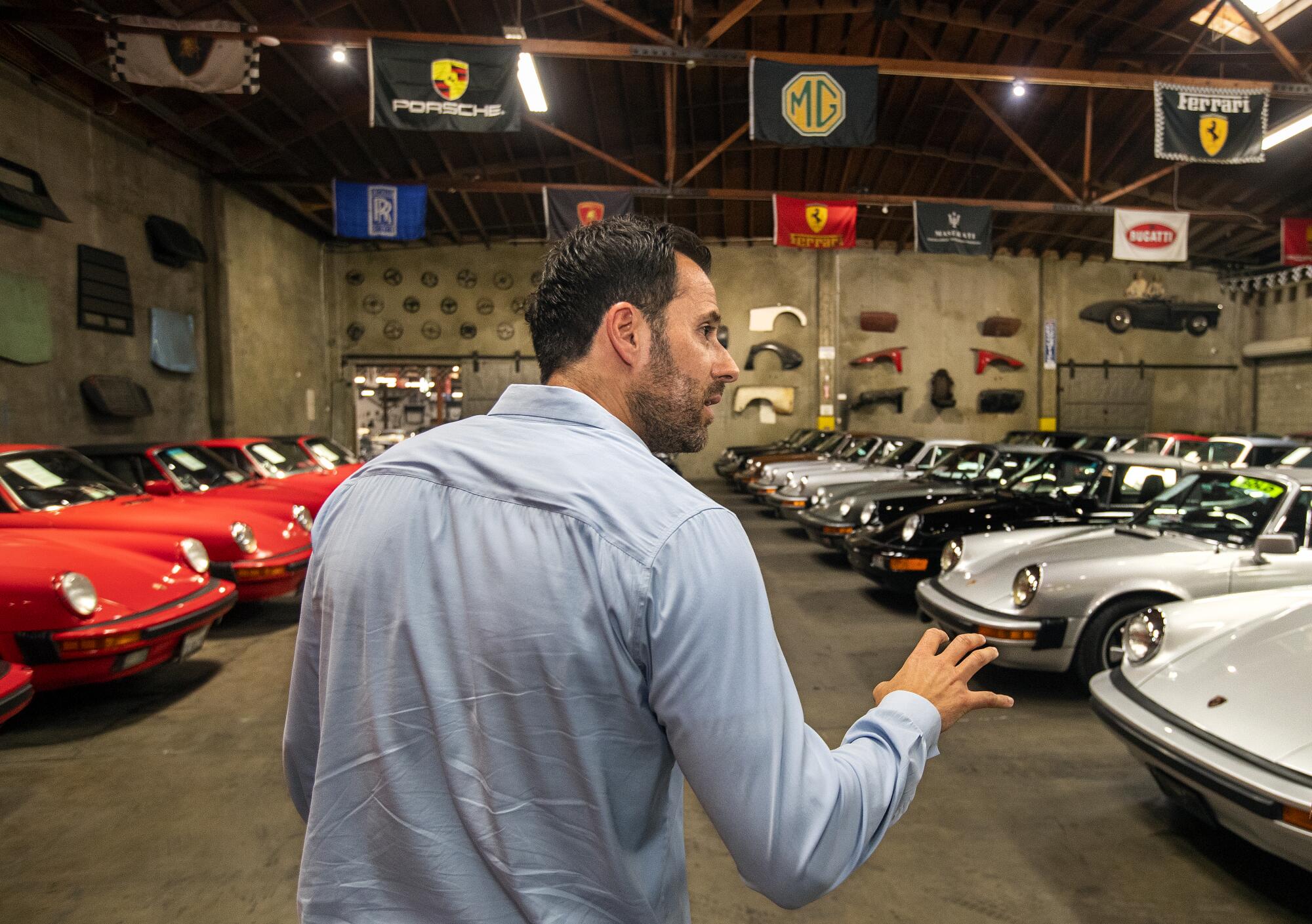
Manos said that his dealership had received a Porsche certificate of authenticity for the car — and that the VIN on the document matched the number “embedded on the frame” of the car. “Hence, there was no reason for anyone to suspect that the vehicle was a ‘fake’ as alleged in the complaint,” he said.
It was “not until the vehicle in question was completely dismantled that the discrepancy was discovered,” Manos said.
Manos acknowledged the vehicle had been altered, but insisted that it had originally been a genuine 1967 Targa S. To explain his reasoning, Manos provided The Times with an email that was written by a person who identified himself as having been involved in a prior sale of the Porsche. In the message, the individual explained that a previous owner had, many years earlier, modified the car because he wanted to transform it from a Targa into a coupe. Then, Manos said, a subsequent owner “restored it back to the vehicle’s factory specifications.”
Amid Miller’s litigation — which sought damages of at least $300,000 — Beverly Hills Car Club filed a cross-complaint against Exact 10 LLC, the Pleasanton, Calif.-based wholesale dealer from which it bought the vehicle. Beverly Hills Car Club alleged in its suit that Exact 10 represented that the car was an actual Targa, and therefore it — and not Manos’ company — should be liable for any losses or damages recovered by Miller in his lawsuit.
Exact 10 denied Beverly Hills Car Club’s claims in a court filing.
Miller and Beverly Hills Car Club reached a settlement in August 2021, according to court records, and the case — as well as the dealership’s action against Exact 10 — was dismissed weeks later. Rogers declined to discuss terms of the agreement but said the matter was “amicably resolved,” and that Exact 10 Chief Executive Ian Fitz-Simon took ownership of the Porsche from Miller.
Citing a nondisclosure agreement, Fitz-Simon declined to comment. Manos said he could not discuss terms of the settlement because of a “confidentiality provision.”
Manos has acknowledged personally experiencing the sort of trouble that Miller allegedly endured after buying a car from Beverly Hills Car Club. Manos told VoyageLA in 2019 about “the difficulties you confront” when buying a vehicle that “turns out not to be what you think it is.”
“You have to take stock of it and start again,” said Manos, who gave a specific example. “I purchased a car which arrived in boxes, and it reduced the bank balance by $30k in a nanosecond. Not only that, it took a further six months to put it together.”
It was, Manos said, “a nightmare.”
Times researcher Scott Wilson contributed to this report.
More to Read
Sign up for Essential California
The most important California stories and recommendations in your inbox every morning.
You may occasionally receive promotional content from the Los Angeles Times.

